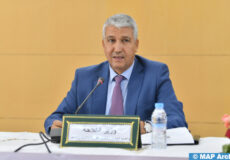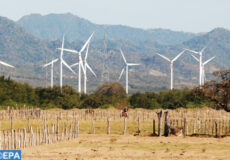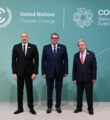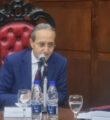OCP Group Dedicates 4 MT of Fertilizers to Strengthen Food Security in Africa
Casablanca – OCP Group has announced its commitment to dedicate 4 million tonnes of fertilizers to strengthen food security in Africa by 2023.
“Yesterday, OCP Group Chairman & CEO, Mostafa Terrab announced at the World Bank Annual Meetings that the OCP Group, a global leader in plant nutrition and the world’s largest producer of phosphate-based fertilizers, has committed to reserve over 4 million tonnes of fertilizers for African farmers in 2023,” the Group said in a statement received Wednesday by MAP.
This is more than double OCP’s supply to the continent in 2021 and represents over a quarter of OCP’s expected total output, according to the same source.
In line with OCP’s farmer-centric approach, this fertilizer supply program will include training and capacity building alongside local partners. This allocation ensures that the right fertilizers will be available to the whole continent, helping to boost yields for 44 million farmers across 35 countries, including Morocco, where the company is based.
OCP has heavily invested in the development of eco-responsible fertilizer production capacity, reaching 15 MT of finished product by 2023, from a base of 3MT in 2008. This permits the Group to respond to Africa’s urgent needs while also supporting farmers around the world.
The OCP Group promotes a holistic approach that brings together partners throughout the value chain to provide the support that farmers need to be successful and to ensure that the continent’s vast farming potential is unlocked for the benefit of Africa and the world.
This current effort builds upon our long-term engagement by OCP in Africa. The subsidiary OCP Africa has developed a comprehensive farmer-centric approach, which has already reached more than 2 million farmers with fertilizer customization, soil mapping, training, field trials and market linkages.
“The current geopolitical situation reveals deeper systemic fragilities in global agricultural systems. We have to address the challenges facing African farmers, from infrastructure to knowledge to market access to financing,” Terrab said.
“We are glad to be able to do our part and we are thankful for the excellent dialogue and collaboration with the World Bank, IFC, USAID, as well as other multilateral and development agencies involved in this effort, given their demonstrated leadership and long-term commitment to African development,” he added.
OCP plays an important role in feeding a growing global population by providing essential elements for soil fertility and plant growth. With a century of experience and revenues reaching US$ 9.4 billion in 2021, OCP is a leader in plant nutrition and the world’s largest producer of phosphate-based fertilizers.
Headquartered in Morocco and present on five continents, OCP works in close partnership with more than 350 customers across the world. Closer to home, OCP is committed to accelerating Africa’s environmental and social development and implement sustainable and prosperous agriculture through continuous innovation.
The Group is firmly convinced that leadership and profitability are necessarily synonymous with social responsibility and sustainable development. Its strategic vision is rooted in the meeting of these two dimensions.
Created in 2016, OCP Africa, a subsidiary of the OCP Group, aims to contribute to the development of integrated agricultural ecosystems in Africa. OCP Africa works hand in hand with farmers to help grow the agricultural potential of the African continent through solutions adapted to local conditions and to the needs of soils and crops.
In partnership with a network of partners, including governments, non-profit organizations, and companies, OCP Africa works continuously to put all the necessary conditions for the benefit of farmers.
OCP Africa has local offices in many African countries (Côte d’Ivoire, Senegal, Cameroon, Kenya, Ghana, Nigeria, Zambia, Benin, Tanzania, Ethiopia, Burkina Faso, and Rwanda) and is present on the ground in many others. It is also helping to secure the production of competitive fertilizers near major agricultural regions, to strengthen its logistical capacities and to develop new local distribution networks.













